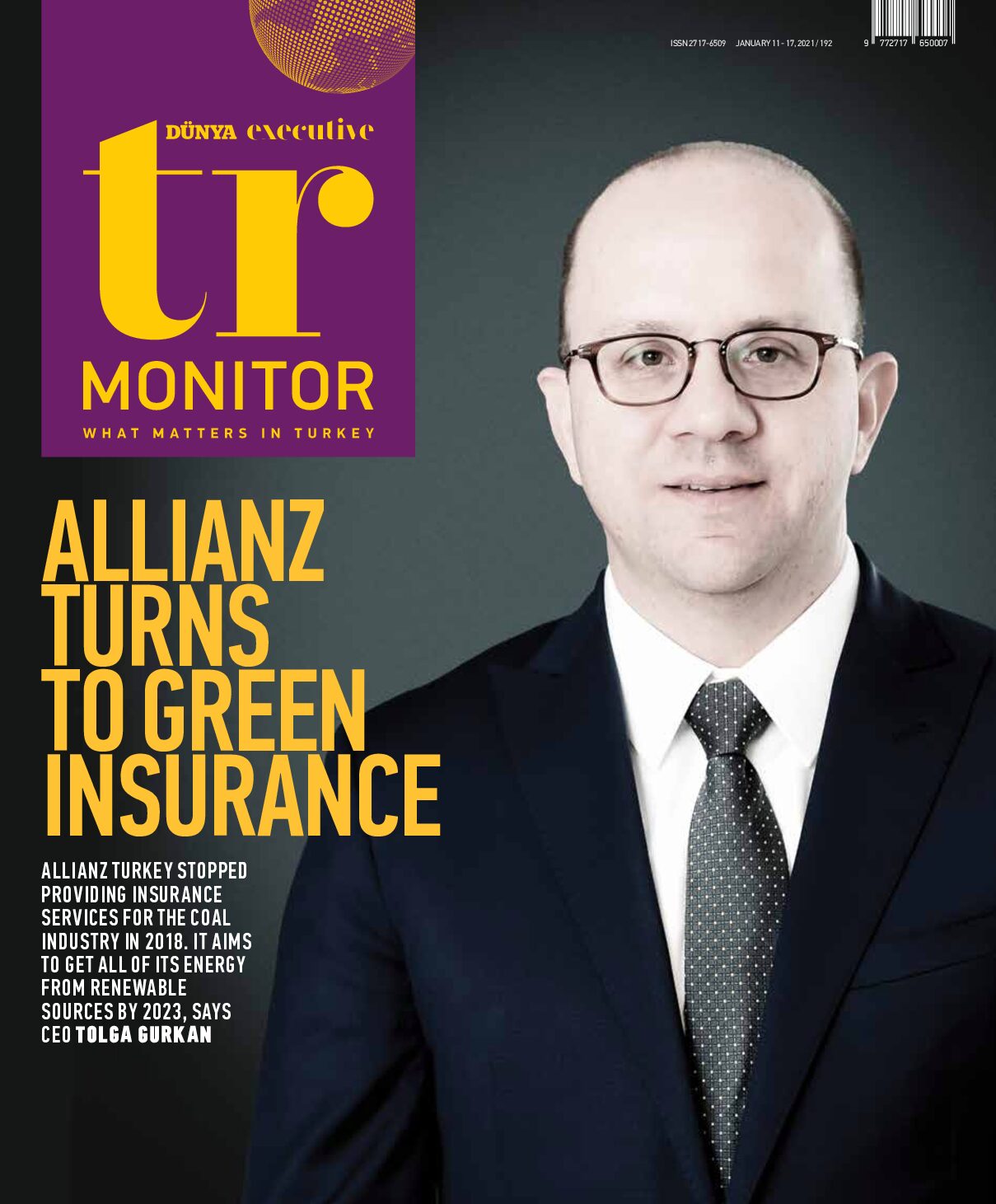By DIDEM ERYAR UNLU
THE FREQUENCY and degree of damage from natural disasters have been increasing significantly over the last decade. The losses they cause in infrastructure, residential areas, workplaces, agriculture lands and health are covered by insurance industry, which plays a key role in identifying risks and then managing and mitigating them, as well as protecting those assets. This has been prompting companies to transform their way of doing busines.
Allianz Turkey has stopped providing services to the coal industry. The Allianz Group’s Climate Change Program set rules in 2018 and the Turkish subsidary quit renewing policies of coal businesses, he says. The total value of policies that weren’t renewed amounted to TRY 17.5m and the practice continues, the CEO notes. The company prefers to insure risks that support the low carbon economy. It has a wide range of products for renewable energy facilities. It is also supporting efforts to educate people and customers to protect and manage risks emanating from climate change, according to Gurkan.
“Our goal is to have all our energy come from renewable sources by 2023,” Gurkan says.
Allianz Turkey ’s parent company, the Allianz Group, is among the top in the insurance industry leading the global sustainability initiative. It has signed the United Nation’s Sustainable Insurance Principles and has been taking part in the Dow Jones Sustainability Index since 2000.
Environmental risks and climate change have been observed at the top of Allianz Risk Barometer and other risk reports in the last few years, Gurkan says. “We are not anymore only sharing our previous financial reports but also our future values and efforts for a sustainable future transparently and integretad with our business strategy.”
Allianz Turkey developed Turkey ’s first sustainability strategy in the insurance industry in 2016. With the mentality that you won’t be able to manage anything you can’t measure, it has began publishing sustainability reports in accordance with the Global Reporting Initivative (GRI) standards, he adds. Since then, the company has been following the Sustainable Development Goals, Global Compact and Women’s Empowerment Principles (WEPs), Gurkan says, adding that the company has been leading a critical change in the industry.
SUSTAINABLE VALUE MODEL
Allianz Turkey published the “2019 Integrated Report” in the last days of 2020, becoming the only non-listed company and the first in Allianz Group and in the Turkish insurance and private pension industry that voluntarily took responsibility in the sustainability area. The report was the 11th in the private sector and Allianz Turkey has integrated its Sustainability in Creating Values Model in its business practices, Gurkan notes. The Environmental, Social and Governance
(ESG) principles have also been absorbed by the company and integrated thinking has become part of corporate culture, he remarks.
Global investors and companies are increasingly applying these non-financial ESG factors as part of their analysis process to identify material risks and growth opportunities.
“For a better environment, we are managing climate risks and covering risks of businesses that are working with low carbon economy models,” the CEO says.
“To be a better company, we are constantly transforming ourselves and respect business ethics, while using an effective risk management system. We are also integrating ESG and sustainability principles in our processes.”
BROADER PERSPECTIVE
ESG investments are rallying globally. The world is entering an era where companies that integrate their processes and create value not only economically but also in the environmental and social aspects of business, will gain competitive advantage, Gurkan emphasizes. Those, who are left behind will feel the burden.
“The pandemic has proven that all companies should review their business practices with an eye to the ESG dimensions. The Insurance industry has a responsibility in supporting the transformation to a climate-friendly economy,” Gurkan concludes.
***
REPORTING FOR THE FUTURE
The 2019 Integrated Report has been prepared in accordance with the International Integrated Reporting Council’s (ERTA) Turkish network, of which Allianz Turkey CEO Tolga Gurkan is a board member. It is also obeying the GRI principles. Integrated reporting is a reflection of a mentality in reviewing business functions and financial data together with environmental, social and governance perspectives in a holistic manner, says Gurkan. “It is a reporting model that links and evaluates all resources used and value created by the company in short, medium and long terms. It provides trustworthy, holistic, standard and comparable data for investors. It not only maintains transparency in past financial performance but also in reporting the investment decisions of the future, besides the actions taken regarding risk and opportunity.”
CHRONOLOGY
✓ Established as Sark Sigorta in 1923 by the Italian insurance company Riunione Adriatica Di Sicurta.
✓ Some 51 years later, Koc Holding acquired Sark Sigorta.
✓ In 1988, Allianz and Tokio Marine became partners in Sark Sigorta
✓ In 1991, life insurance company Sark Hayat Sigorta was established.
✓ In 1998, renamed as Koc Allianz Sigorta and Koc Allianz Hayat Sigorta
✓ In 2008, Allianz acquired the shares of Koc Holding and renamed it Allianz Sigorta and Allianz Hayat ve Emeklilik.
✓ In 2013, it acquired Yapi Kredi Sigorta and Yapi Kredi Emeklilik.
✓ In 2014, a merger of elementary insurance companies under Allianz Sigorta was finalized.
✓ In 2015, the company headquarter moved to Allianz Tower in Istanbul and a year later decided to grow regionally.
ABOUT ALLIANZ TURKEY
✓ Has activities in more than 70 countries with over 147,000 employees and 100 million customers
✓ Has more than EUR 1.7tr in assets under management
✓ Its subsidiaries in Turkey include Allianz Sigorta, an elementary insurance company, Allianz Yasam ve Emeklilik and Allianz Hayat ve Emeklilik, the life insurance and pension arms, as well as Euler Hermes and AWP.
✓ Vehicle, private health, home, workplace, travel health, institutional, liabilities, transportation and aviation, agriculture, pension, automatic enrollment, personal and corporate life insurance are in its portfolio.
✓ It has 2,500 employees, 12 regional headquarters, 3,900 agencies, 1,800 bancassurance agencies with 6,700 corporate agreements and 5.5 million customers.
✓ It posted TRY 12.4bn premium and state subsidy in 2019.
✓ It has invested more than EUR 1bn in Turkey since 2008.









